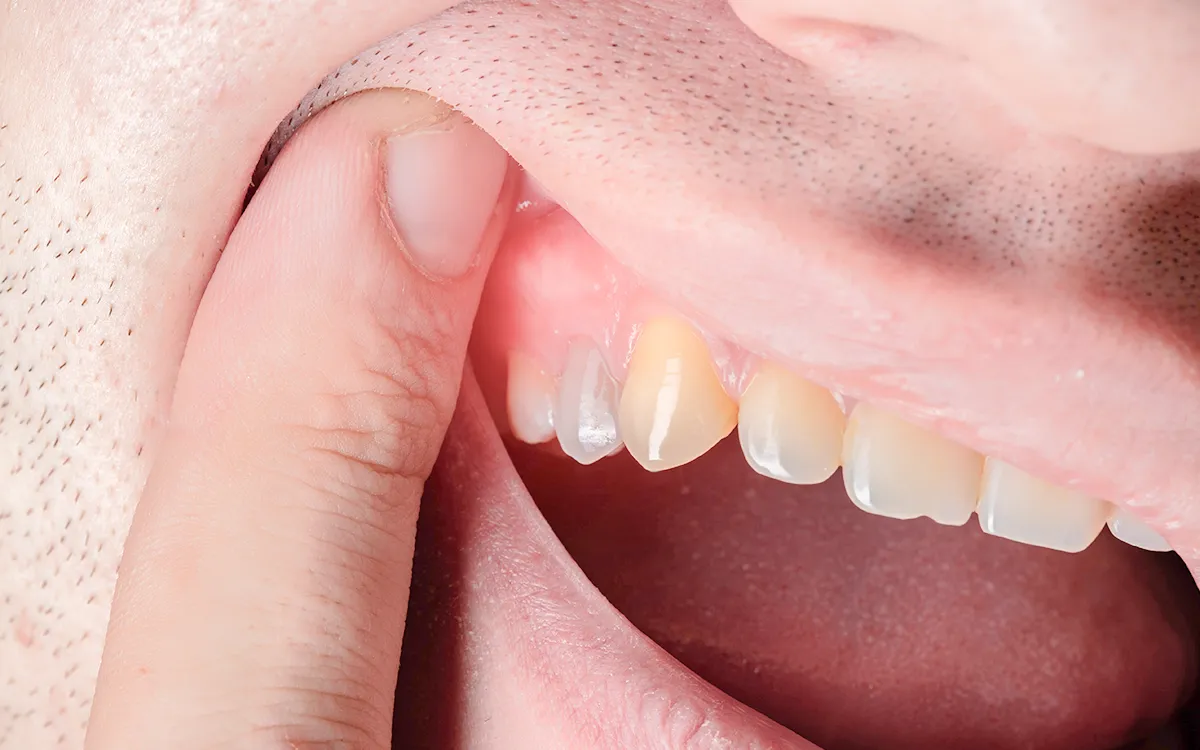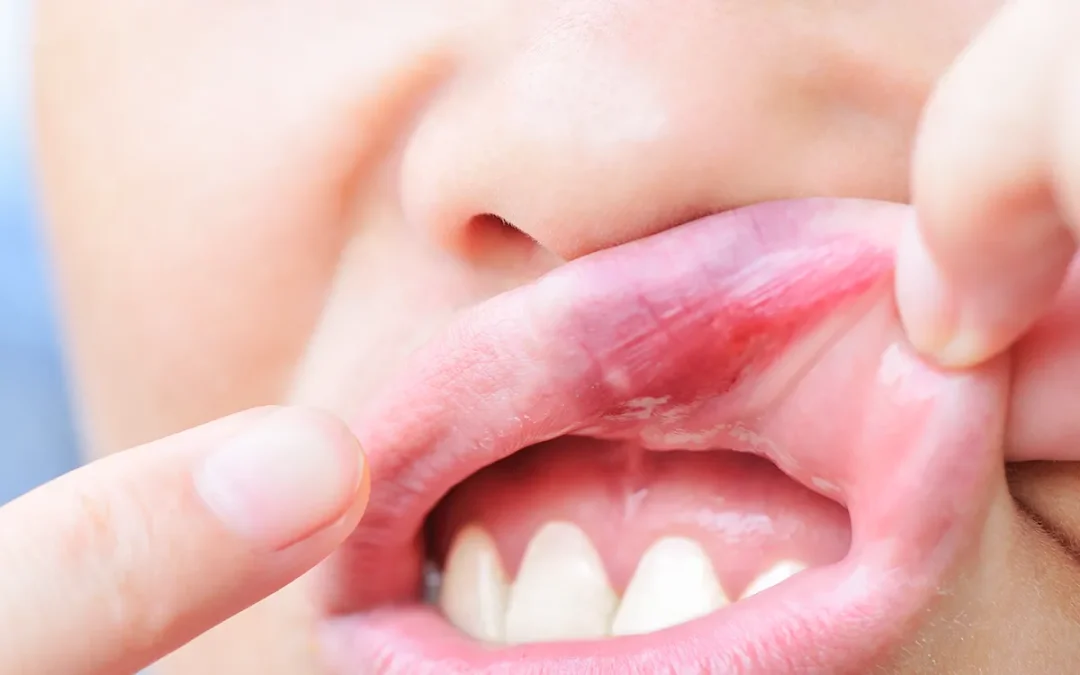Uncomfy dentures may reveal fungal infections
Dull aches or redness under dentures can be red flags. . It’s easy to blame the soreness on a poor fit or pressure spots, or maybe you think it’s just from wearing your dentures too long. But truth be told, that lingering discomfort could actually be a sign of denture stomatitis. This results from a common fungal infection, and affects many denture wearers without them even realising it.
An oral fungal infection is obviously bad news, but there’s good news too. It’s treatable, and even better, preventable. Understanding what causes denture stomatitis and how to care for your dentures properly can make all the difference in keeping your mouth feeling fresh, healthy, and comfortable every day.
Let’s take a closer look at what this sneaky condition really is, why it develops, and the simple ways you can protect your smile from it.
What is denture stomatitis?
Denture stomatitis (also known as oral thrush under dentures) is an inflammation of the soft tissues in the mouth — most commonly the upper palate — that occurs underneath a denture. The condition is usually linked to an overgrowth of a naturally occurring fungus called Candida albicans.
This fungus normally lives harmlessly in the mouth, kept in balance by saliva and the body’s immune defences. However, when the environment under a denture becomes warm, moist, and poorly ventilated, Candida can thrive and multiply, leading to infection and inflammation of the tissues it touches.
In its early stages, denture stomatitis may not cause any noticeable pain, which is why many people overlook it. Over time, though, it can lead to persistent redness, swelling, and irritation beneath the denture. These changes can make the denture feel less comfortable or even alter how well it fits, sometimes affecting how you eat or speak.

Signs of dental stomatitis
Some people with denture stomatitis don’t notice symptoms straight away, which is why regular dental checkups are important. However, here are the most common signs to watch for:
- Redness or swelling on the palate or gums where the denture rests
- Tender or sore areas beneath the denture, sometimes with a burning or stinging sensation
- Discomfort when eating or swallowing
- White or creamy patches on the affected tissues (more common in advanced cases)
- Dryness or cracking at the corners of the mouth (angular cheilitis), often seen alongside fungal infections
- Bad taste or mild odour from the mouth
- Denture looseness or instability due to inflammation and tissue changes
- Shiny or smooth-looking mucosa under the denture (a subtle early sign some people overlook)
If you notice any of these, it’s best to have your dentist take a closer look. Early diagnosis and treatment can prevent the infection from worsening and help keep your dentures fitting comfortably.
How does denture stomatitis develop?
A fungus named Candida albicans is typically the culprit behind behind denture stomatitis. This thrives in warm, moist environments, just like the space beneath a denture. While Candida naturally lives in most mouths without causing harm, certain factors can disrupt this balance and allow the fungus to multiply, leading to infection and inflammation.
Common contributing factors include:

Keeping dentures in while you sleep creates a warm, closed environment where Candida can grow unchecked. The constant pressure on the soft tissues also reduces blood flow and tissue recovery time.
Not brushing or soaking dentures daily allows biofilm — a sticky layer of bacteria, fungi, and debris — to build up on their surface. This biofilm acts as a reservoir for infection and makes it harder for antifungal treatments to work.
Loose or unstable dentures can rub against the gums, causing tiny abrasions that make it easier for fungal organisms to invade the tissue. Gaps between the denture and the palate can also trap food and moisture.
Saliva naturally helps wash away microbes and has antifungal properties. Reduced saliva flow, often caused by certain medications, dehydration, or medical conditions, allows fungal organisms to thrive.
Tobacco alters the natural balance of microorganisms in the mouth, weakens the immune response of oral tissues, and increases the risk of fungal infections.
Medical conditions like diabetes, nutritional deficiencies, or immune suppression (due to illness or medication) can make it harder for the body to control fungal growth and heal affected tissues.
Why you can’t ignore this
Denture stomatitis pain might seem like something you just have to put up with as you get older or wear dentures — a kind of “you get what you get and don’t get upset” situation. But that couldn’t be further from the truth. You don’t need to suffer, and you shouldn’t. This type of infection deserves care and attention, because treating it early can restore comfort and help keep your mouth healthy.
If ignored, denture stomatitis can:
- Lead to chronic soreness and irritation, making it uncomfortable to wear dentures for long periods or enjoy certain foods.
- Alter denture fit, as inflamed or swollen gum tissues change shape and no longer provide a stable base.
- Increase the risk of secondary infections, such as angular cheilitis (cracking at the corners of the mouth) or further fungal spread within the oral cavity.
- Affects overall oral and general health, especially in older adults or individuals with weakened immune systems, diabetes, or other health conditions.
A healthy mouth ensures your dentures stay comfortable, stable, and functional. Addressing even mild inflammation early, and keeping up with good oral and denture care, can make all the difference in maintaining your comfort and confidence every day.
How to prevent denture stomatitis
Excellent daily habits make all the difference when it comes to keeping your mouth healthy and your dentures comfortable. By taking a few simple steps, you can greatly reduce the risk of fungal buildup and irritation.
Give your mouth a well-deserved rest. Taking dentures out while you sleep allows your tissues to recover and helps prevent the warm, moist environment where fungi thrive.
Brush them gently with a soft denture brush and mild soap or denture cleanser. Avoid regular toothpaste, which can be abrasive and scratch the surface, creating spots where bacteria and fungi can cling.
Keep them in water or a denture cleaning solution while you sleep. This helps eliminate microorganisms and prevents your dentures from drying out or warping.

Even without teeth, your mouth still needs cleaning. Use a soft toothbrush or a piece of clean gauze to gently remove plaque and keep the tissues healthy before reinserting your dentures.
A dry mouth encourages fungal growth. Drink plenty of water throughout the day, and if you regularly experience dryness, mention it to your dentist. They can recommend saliva substitutes or other remedies.
Regular checkups help ensure your dentures still fit properly and that your oral tissues remain healthy. Your dentist can also professionally clean your dentures and detect early signs of infection before they become serious.
Tobacco use increases the risk of oral infections and slows healing. Quitting or cutting back will benefit not only your mouth but your overall health.
When to see your dentist
If you notice redness, soreness, or white patches under your dentures that don’t seem to improve, it’s best not to self-treat or wait it out. Your dentist can examine the affected area, confirm whether it’s denture stomatitis, and provide the right treatment, which may include antifungal medication, professional denture cleaning, or adjustments to improve the fit.
While over-the-counter remedies might offer short-term relief, the infection is likely to return if the underlying cause isn’t properly managed. That means creating a personalised treatment plan to effectively address the root cause, whether that be fungal buildup, poor denture hygiene, an ill-fitting denture, or some other concern.
Seeing your dentist early ensures the issue is treated at its source and helps you get back to wearing your dentures comfortably and confidently.
Don’t let denture soreness steal your smile.
Don’t put up and shut up when it comes to denture pain. Denture stomatitis might be common, but that doesn’t make it normal. It’s preventable, treatable, and worth fixing. A few simple habits like cleaning your dentures daily, giving your mouth a rest at night, and seeing your dentist regularly can keep your mouth healthy and comfortable. You deserve dentures that feel just right and a life you can enjoy without extra pain.
If you’ve noticed a bit of soreness under your dentures, or it’s simply been a while since your last check-up, now’s the perfect time to book a visit. Get the personalised treatment you need right now, so you can step into every day in comfort and confidence.



